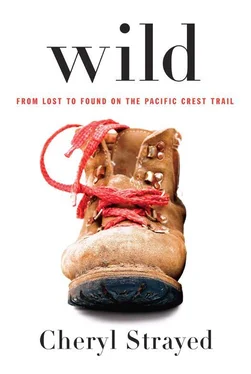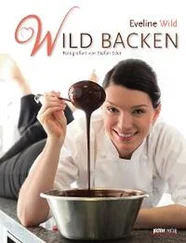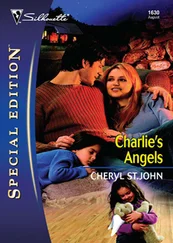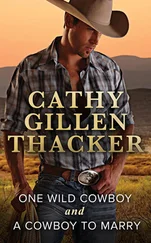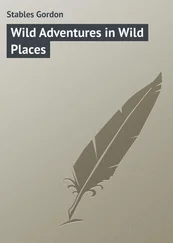Cheryl Strayed - Wild
Здесь есть возможность читать онлайн «Cheryl Strayed - Wild» весь текст электронной книги совершенно бесплатно (целиком полную версию без сокращений). В некоторых случаях можно слушать аудио, скачать через торрент в формате fb2 и присутствует краткое содержание. Год выпуска: 2012, ISBN: 2012, Жанр: Современная проза, на английском языке. Описание произведения, (предисловие) а так же отзывы посетителей доступны на портале библиотеки ЛибКат.
- Название:Wild
- Автор:
- Жанр:
- Год:2012
- ISBN:978-0-307-95765-8
- Рейтинг книги:4 / 5. Голосов: 1
-
Избранное:Добавить в избранное
- Отзывы:
-
Ваша оценка:
- 80
- 1
- 2
- 3
- 4
- 5
Wild: краткое содержание, описание и аннотация
Предлагаем к чтению аннотацию, описание, краткое содержание или предисловие (зависит от того, что написал сам автор книги «Wild»). Если вы не нашли необходимую информацию о книге — напишите в комментариях, мы постараемся отыскать её.
Wild — читать онлайн бесплатно полную книгу (весь текст) целиком
Ниже представлен текст книги, разбитый по страницам. Система сохранения места последней прочитанной страницы, позволяет с удобством читать онлайн бесплатно книгу «Wild», без необходимости каждый раз заново искать на чём Вы остановились. Поставьте закладку, и сможете в любой момент перейти на страницу, на которой закончили чтение.
Интервал:
Закладка:
It was sunny and clear but the air was cool, and it grew progressively cooler with each day as I passed into the Sky Lakes Wilderness, where the trail stayed above 6,000 feet. The views opened up again as I walked along a ridgeline of volcanic rocks and boulders, glimpsing lakes occasionally below the trail and the land that spread beyond. In spite of the sun, it felt like an early October morning instead of a mid-August afternoon. I had to keep moving to stay warm. If I stopped for more than five minutes the sweat that drenched the back of my T-shirt turned icy cold. I’d seen no one since I left Ashland, but now I encountered a few day hikers and overnight backpackers who’d climbed up to the PCT on one of the many trails that intersected it, which led to peaks above or lakes below. Mostly I was alone, which wasn’t unusual, but the cold made the trail seem even more vacant, the wind clattering the branches of the persevering trees. It felt colder too, even colder than it had been up in the snow above Sierra City, though I saw only small patches of snow here and there. I realized it was because back then the mountains had been moving toward summer, and now, only six weeks later, they were already moving away from it, reaching toward autumn, in a direction that pushed me out.
One night I stopped to camp, stripped off my sweaty clothes, dressed in every other piece of clothing I had, and quickly made dinner, zipping myself into my sleeping bag as soon as I finished eating, chilled to the bone, too cold even to read. I lay curled into myself in a fetal position with my hat and gloves on all night long, barely able to sleep. When the sun rose at last, it was 26 degrees and my tent was covered in a thin layer of snow; the water in my bottles was frozen, though they’d been beside me inside the tent. As I broke camp without a sip of water, eating a protein bar instead of my regular granola mixed with Better Than Milk, I thought again of my mother. She’d been looming for days, riding low and heavy in my mind since Ashland, and now finally, on the day of the snow, she was undeniably here.
It was August 18. Her birthday. She’d have been fifty that day, if she’d lived.
She didn’t live. She didn’t get to be fifty. She would never be fifty , I told myself as I walked under the cold and bright August sun. Be fifty, Mom. Be fucking fifty , I thought with increasing rage as I forged on. I couldn’t believe how furious I was at my mother for not being alive on her fiftieth birthday. I had the palpable urge to punch her in the mouth.
Her previous birthdays hadn’t brought up the same rage. In past years, I’d been nothing but sad. On the first birthday without her — on the day that she’d have been forty-six — I’d spread her ashes with Eddie, Karen, Leif, and Paul in the little rock-lined flowerbed we’d made for her in a clearing on our land. On her three subsequent birthdays, I’d done nothing but cry as I sat very still listening with great attention to the entire Judy Collins album Colors of the Day , its every note seeming to be one of my cells. I could bear to listen to it only once each year, for all the memories of my mother playing it when I was a child. The music made it feel like my mother was right there with me, standing in the room — only she wasn’t and would never be again.
I couldn’t allow even a line of it now on the PCT. I deleted each and every song from the mix-tape radio station in my head, pressing an imaginary rewind in a desperate scramble, forcing my mind to go static instead. It was my mother’s not-fiftieth birthday and there would be no song. Instead, I passed by high lakes and crossed over blocky volcanic rocks as the night’s snow melted on the hardy wildflowers that grew among them, hiking faster than ever while thinking uncharitable thoughts about my mother. Dying at forty-five had only been the worst thing she’d done wrong. As I hiked, I made a catalogue of the rest, listing them painstakingly in my head:
She’d gone through a phase during which she’d smoked pot on an occasional but regular basis and had no qualms about doing it in front of my siblings and me. Once, stoned, she’d said, “It’s only an herb. Like tea.”
It hadn’t been uncommon for my brother, sister, and me to be left alone when we lived in the apartment buildings full of single moms. She told us we were old enough to look after ourselves for a few hours because she couldn’t afford a babysitter. Plus, there were all those other moms we could go to if something went wrong, she said. But we needed our mom.
During this same period, when she became really mad, she often threatened to spank us with a wooden spoon, and a few times, she’d followed through.
Once she said it was perfectly okay with her if we wanted to call her by her first name instead of calling her Mom.
She could be cool and often distant with her friends. She loved them, but she kept them at arm’s length. I don’t think she truly let any one of them all the way in. She held to her belief that “blood was thicker than water,” in spite of the fact that my family was rather short of blood relations who didn’t live hundreds of miles away. She maintained an air of insularity and privacy, participating in the community of friends, but also sealing off our family from it. This was why no one had swooped in when she died, I supposed, why her friends had left me in peace in my inevitable exile. Because she had not held any of them very close, none of them held me. They wished me well, but they didn’t invite me to Thanksgiving dinner or call me up on my mom’s birthday to say hello after she died.
She was optimistic to an annoying degree, given to saying those stupid things: We’re not poor because we’re rich in love! or When one door closes, another one opens up! Which always, for a reason I couldn’t quite pin down, made me want to throttle her, even when she was dying and her optimism briefly and desolately expressed itself in the belief that in fact she wouldn’t die, so long as she drank a tremendous amount of wheatgrass juice.
When I was a senior in high school, she didn’t ask where I would like to go to college. She didn’t take me on a tour. I didn’t even know people went on tours until I went to college and others told me they’d gone on them. I was left to figure it out on my own, applying to a single college in St. Paul for no reason whatsoever other than it looked nice on the brochure and it was only a three-hour drive away from home. Yes, I had slacked a bit in high school, playing the dumb blonde so I wouldn’t be socially ostracized because my family lived in a house with a honey bucket for a toilet and a woodstove for heat; and my stepfather had long hair and a big bushy beard and drove around in a demolished car that he’d made into a pickup truck by himself with a blowtorch, a chain saw, and a few two-by-fours; and my mother opted not to shave under her arms and to say things to the red-blooded gun-loving locals like Actually, I think hunting is murder . But she knew I was secretly smart. She knew I was intellectually avid, devouring books by the day. I’d scored in the upper percentiles on every standardized test I ever took, to everyone’s surprise but hers and mine. Why hadn’t she said, Hey, maybe you should apply to Harvard? Maybe you should apply to Yale? The thought of Harvard and Yale hadn’t even crossed my mind back then. They seemed to be utterly fictitious schools. It was only later that I realized that Harvard and Yale were real. And even though the reality is they wouldn’t have let me in — I honestly wasn’t up to their standards — something inside me was smashed by the fact that there’d never even been the question that I could give them a shot.
But it was too late now, I knew, and there was only my dead, insular, overly optimistic, non-college-preparing, occasionally-child-abandoning, pot-smoking, wooden-spoon-wielding, feel-free-to-call-me-by-my-name mom to blame. She had failed. She had failed. She had so profoundly failed me.
Читать дальшеИнтервал:
Закладка:
Похожие книги на «Wild»
Представляем Вашему вниманию похожие книги на «Wild» списком для выбора. Мы отобрали схожую по названию и смыслу литературу в надежде предоставить читателям больше вариантов отыскать новые, интересные, ещё непрочитанные произведения.
Обсуждение, отзывы о книге «Wild» и просто собственные мнения читателей. Оставьте ваши комментарии, напишите, что Вы думаете о произведении, его смысле или главных героях. Укажите что конкретно понравилось, а что нет, и почему Вы так считаете.
